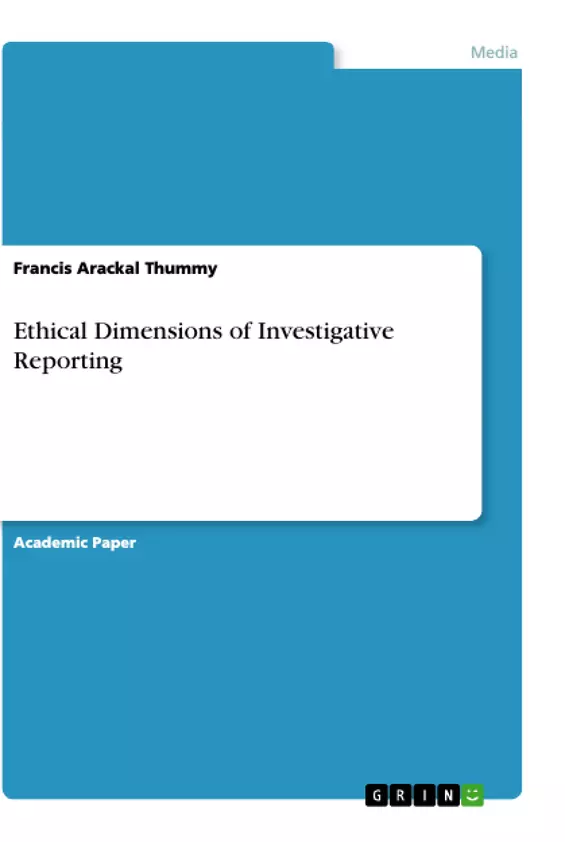One of the most authoritative definitions of Investigative Reporting (IR) comes from the association of Investigative Reporters and Editors (IRE): It is the reporting, through one’s own work, product and initiative, matters of importance which some persons or organizations wish to keep secret. According to this definition the three basic elements of IR are: that the investigation be the work of the reporter, not a report of an investigation made by someone else; that the subject of the story involves something of reasonable importance to the reader or viewer; and that others are attempting to hide these matters from the public. At the same time it should be added that views on IR is somewhat polarized.
The answer to why IR is needed is manifold. Some of the tools that could be used for IR are archives, whistle-blowers, anonymous sources, and undercover operations (Sting). IR is a public service and it is a powerful catalyst for change and so it should be based on ethical principles. Some of the ethical principles on which an investigative reporter might base his/her work are: Aristotle’s Golden Mean; Kant’s Categorical Imperative; Mill’s Principle of Utility; and Judeo-Christian Principle. For, he/she would have to face ethical dilemmas connected to sources, sting (hidden camera and bribery), fake stings, objectivity, privacy, and trial by media.
Table of Contents
- What is Investigative Reporting?
- Why Investigative Reporting?
- Investigative Reporting a Public Service:
- Exposes corruption at the level of the government
- Reveals abuse of official power
- Brings out the denial and delay of justice
- Questions the official facts and figures
- Shows how laws are violated and circumvented
- Discloses cover-ups and
- Identifies shameful societal practices.
- Ethical Dimensions of IR
- Ethical Principles
- Aristotle's Golden Mean
- Kant's Categorical Imperative
- Mill's Principle of Utility'
- Judeo-Christian Principle
Objectives and Key Themes
This text aims to provide a comprehensive understanding of investigative reporting, its significance in public service, and the ethical considerations that govern this practice. It analyzes the multifaceted nature of investigative journalism, exploring its definition, motivations, and its role as a catalyst for social change.
- The definition and characteristics of investigative reporting.
- The importance and impact of investigative reporting in society.
- Ethical principles applicable to investigative reporting, including the Golden Mean, Categorical Imperative, Utilitarianism, and the Judeo-Christian Principle.
- The ethical dilemmas faced by investigative reporters in their work.
- The role of investigative reporting in holding authorities accountable and promoting justice.
Chapter Summaries
- What is Investigative Reporting? This chapter defines investigative reporting as the uncovering and reporting of significant matters that individuals or organizations attempt to conceal. It highlights the key elements of investigative reporting, including the reporter's independent work, the importance of the subject matter, and the efforts to keep information from the public.
- Why Investigative Reporting? This chapter emphasizes the vital role of investigative reporting in holding individuals, communities, societies, and governments accountable. It argues that the media, particularly investigative journalists, play a crucial role in exposing misdeeds and challenging powerful entities.
- Investigative Reporting a Public Service: This chapter outlines the various public service functions of investigative reporting, including exposing corruption, revealing abuse of power, bringing light to injustice, questioning official information, and exposing illegal practices.
- Ethical Dimensions of IR: This chapter explores the ethical considerations involved in investigative reporting. It examines the business-oriented nature of the media, the ethical complexities of investigative journalism, and the need for moral principles to guide reporters' actions.
- Ethical Principles: This chapter delves into four prominent ethical principles: Aristotle's Golden Mean, Kant's Categorical Imperative, Mill's Principle of Utility, and the Judeo-Christian Principle. It analyzes how these principles apply to investigative reporting and the moral choices reporters face.
Keywords
The core keywords and concepts explored in this text include investigative reporting, public service, ethics, journalism, media, corruption, abuse of power, justice, accountability, Golden Mean, Categorical Imperative, Utilitarianism, Judeo-Christian Principle, moral dilemmas, sources, whistleblowers, anonymous sources, undercover operations, objectivity, privacy, trial by media.
Frequently Asked Questions
What is the definition of Investigative Reporting (IR)?
Investigative Reporting is the reporting, through a journalist's own initiative and work, of matters of importance that individuals or organizations wish to keep secret.
What are the three basic elements of IR?
The three elements are: the investigation must be the reporter's own work, the subject must be of reasonable importance to the public, and there must be an attempt by others to hide the information.
Which ethical principles guide investigative reporters?
Key principles include Aristotle’s Golden Mean, Kant’s Categorical Imperative, Mill’s Principle of Utility, and the Judeo-Christian Principle.
What ethical dilemmas do investigative journalists face?
Reporters often face dilemmas regarding the use of anonymous sources, undercover operations (stings), bribery, invasion of privacy, and the risk of 'trial by media'.
Why is Investigative Reporting considered a public service?
It serves the public by exposing government corruption, revealing abuse of power, disclosing cover-ups, and identifying shameful societal practices that need change.
- Quote paper
- Prof. Francis Arackal Thummy (Author), 2019, Ethical Dimensions of Investigative Reporting, Munich, GRIN Verlag, https://www.grin.com/document/513238



